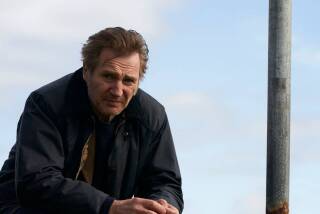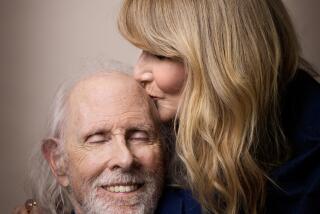‘Warrior’s’ Tom Hardy and Joel Edgerton roll with the punches
In “Warrior,” estranged brothers Brendan and Tommy Conlon search for relief in an unlikely place — the sweaty cage of a mixed martial arts tournament. Brendan, played by Australian Joel Edgerton, is a middle school teacher slugging to keep from losing his home, and Tommy (British actor Tom Hardy) an Iraq war veteran running from a murky past. In the sports drama, which opens Friday, the Conlon brothers don’t agree on much, except the utter uselessness of their alcoholic father, Paddy (Nick Nolte).
Relative unknowns in Hollywood when they were cast by director Gavin O’Connor in 2009, Hardy and Edgerton are actors on the verge — Hardy plays the villain in next year’s Batman sequel, “Dark Knight Rises,” and Edgerton has been cast as Tom Buchanan in Baz Luhrmann’s 2012 production of “The Great Gatsby.” In July, the “Warrior” stars attended an advance screening of the film at Camp Pendleton. Over barbecue in the locker room of the military base’s movie theater, Hardy and Edgerton discussed the speedy rise of the sport of ultimate fighting, their punishing training for the roles and why America imports so many of its big screen brutes.
What’s it like for you to watch this movie with an audience that’s so vocal during the fight scenes?
Hardy: It’s a real ego boost. It’s almost like it passes the fight test with that scene. Like, yeah, the fighting is gonna be good in this movie. And then they’re ready for more blood. I wanted to stay for that scene and hear the Marines cheer. ‘Cause if they don’t, then I wouldn’t be at this interview. I’d be back in London. No shame. I’m not American. I tried. I failed.
Why are so many of the actors who play tough guys in American movies British and Australian?
Hardy: Australians are probably the toughest race in the world and the U.K. aren’t. The Scottish are next, aren’t they? And then the Irish.
Edgerton: The Australians are actually the worst of the criminals from the United Kingdom, but not worst as in toughest. They’re the ones who did stupid little things and got caught for it. Bad criminals. I’m the great-great-grandson of a sheep stealer.
Hardy: Actually, I think it’s because we cost less and we’re not famous. In all honesty, a lot of imported actors are probably here because they have a certain amount of credibility but they’re not bankable and they’re useful to the machine. They fill a spot in the machine. How it turns out in the long run, we just don’t know.... We were available. [Director Gavin O’Connor] could break our noses and ribs.
What was your daily training regimen?
Hardy: We had to take it seriously ‘cause it was a result-based training. You couldn’t fake it. We had to be at the fight club at 7 or 8 o’clock, train till 3, 4 in the afternoon, and at lunchtime we were loading up, trying to get heavier. We did two hours of boxing, two hours of jujitsu, two hours of weights, two hours choreography, two hours of weight-lifting before we could go home late that night — for six or seven days a week for about 10 weeks. Then we started the shoot. We were shooting 14- to 16-hour days.
Edgerton: And at lunchtime instead of sitting with the crew and eating lunch our stunt guys would turn up and make us do a workout.
Hardy: Puts you right off cage fighting, d’ya know what I mean? It’s brutal.
You went to see some cage fights to prepare. Where did you go and what were they like?
Edgerton: Ohio. They’re all over the place. There’s two UFC (Ultimate Fighting Championship) organized tournaments every month. It’s the fastest growing sport in the States and I think it just became the highest pay-per-view pursued sport.
Why is mixed martial arts growing so fast?
Edgerton: People love boxing, but you’ve gotta wait two or three years for your favorite boxer to have a fight. These UFC guys have a couple fights a year and every time you go on and watch one of these things there’s eight fights organized and an undercard. You’re getting to watch a whole bunch of different fighters and different weight classes.
Did you learn anything that surprised you about ultimate fighters?
Edgerton: I was surprised how much peace and calm these guys try to achieve while they’re fighting, try to breathe really calmly. The best jujitsu practitioners are really serene and grounded. I just assumed you held your breath and tensed all your muscles and tried not to freak out. Everything they think about is fighting, but not through the filter of violence, it’s through the filter of athleticism, of strategy.
Hardy: You look at the bone-breaking brutality of it, the blood side of it, the people who are getting in the ring, who are getting hurt are conditioned to a level where they’re more impervious to that kind of attack than you and me in civilian life. A kick in the shins or a kick in the head, it just doesn’t hurt them as much. If you condition your body to receive constant repetition of action, you callous to it, you get used to it. You’re trying to solve a mathematical equation as simple and primal as choke another man out and not be choked. It becomes a very Zen place. Very weird.
Did your relationship to pain change making this movie?
Edgerton and Hardy: No!
Hardy: Man, it hurts.
More to Read
The biggest entertainment stories
Get our big stories about Hollywood, film, television, music, arts, culture and more right in your inbox as soon as they publish.
You may occasionally receive promotional content from the Los Angeles Times.







